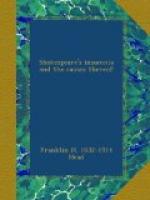These things do overmuch grieve Anne, who hath been to you a loyal wife and a true, and she desires that you do forthwith renounce your evil ways and return to the new house at Stratford, and in ashes and sackcloth repent of your wanderings from the straight and narrow way.
Thus far have I spoken to you as the mouthpiece and vicegerent of Anne, your wife, who is in sore affliction and deep grief by reason of your transgressions. But, beloved lamb of my flock, I should be unworthy my high and sacred calling did I not lift up also my rebuking voice as a pelican in the wilderness, and adjure you to beware of concupiscence and fleshly lust, which unceasingly do war upon the human soul. Thinkest thou to touch pitch and remain undefiled?
The next letter is from the firm of Coke &
Dogberry, lawyers in London.
Inner Temple, March 8, 1609.
To William Shakespeare:
We have been retained by Mistress Anne Page as her solicitors to bring against you an action, for that you have not fulfilled and in sooth cannot fulfil with her a contract of marriage, and to seek against you under the laws of this realm heavy damages and an imprisonment of the body, in that you have in unholy ways trifled with her affections, contrary to the statute in such cases provided. She especially avers that you did, two days before Michaelmas, swear to her on a parcel gilt goblet that you did love her alone, and did then give to her a bracelet of price. But yesterday, as she was bargaining with a yeoman named Christopher Sly, from Stratford, for the purchase of a spotted pig of his own fattening, the said Sly did reveal to her that you were his friend, and that you had wife and children in your native town where he dwelt. We beg you to straightway name to us your solicitors, that we may confer with them and attend to the issuance of the writs.
I have aimed to select from the letters sent me only those bearing on some trouble tending to cause sleeplessness on the part of the poet, but make an exception in case of a letter of Sir Walter Raleigh, next in chronological order, which refers to matters of general interest.
The Mermaid, March 20, 1609.
To William Shakespeare:
Full well do I know, my dearest Will, that often hast thou wondered of the fate of thy L50, which, with a hundred times as much of mine own, was adventured to found an empire in America. Great were our hopes, both of glory and of gold, in the kingdom of Powhatan. But it grieves me much to say that all hath resulted in infelicity, misfortune, and an unhappy end. Our ships were wrecked, or captured by the knavish Spaniards. Our brave sailors are perished. As I was blameworthy for thy risk, I send by the messenger your L50, which you shall not lose by my over-hopeful vision. For its usance I send a package of a new herb




